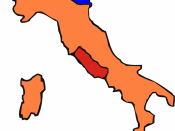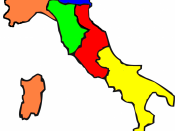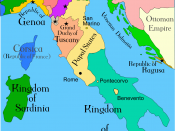Cavour was a very important, if not key player in the reunification of Italy in the 1800s. His role in Italian unification is widely debated, as are is aims and underlying motives. Many hold contrasting views as to whether he was an Italian nationalist or merely a Piedmontese expansionist, and the subject is still a controversial one to this day. The existence of many wide-ranging sources which often challenge each other on the subject does not make the task of determining what drove Cavour any easier for scholars. It is often agreed, however, that Cavour was a very important catalyst in the unification of Italy, wittingly or not. In this essay I shall examine Cavour's role in Italy in the period between 1852 and 1861, and attempt to determine his intentions.
After holding various posts in government and parliament alike, Cavour became premier or prime minister of Piedmont-Sardinia in 1852.
As prime minister, Cavour undertook many reforms which many deemed controversial at the time. His reforms largely liberalised the state, and also modernized it in many ways. Prior to Cavour's becoming prime minister, Piedmont-Sardinia had introduced reforms which ran counter to the Church, the most striking example of which was the abolishment in 1848 of ecclesiastical courts, as well as the introduction of civil marriage (as opposed to Church marriage). These policies were met with protests from the pope at the time, Pope Pius IX. What was started in 1848 was continued with Cavour during his time as premier: a new policy by Cavour ordered the closure of half of the monastic houses within Piedmont-Sardinian territory. Cavour also conducted other reforms, including modernization of transport by building many miles of railway (Piedmont alone had over 800km of railroads at one point), economic alterations (reducing customs duties, founding state saving banks)...


